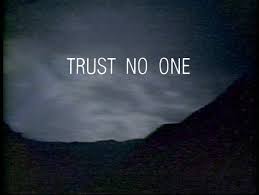Too much mistrust eats away at us, makes our cogs rust and corrode, and ends up hurting us more than it would have helped. We can get caught, and feel the infinite pain from a disappointed brother or mother; or we can strain under the heaviness of mistrust, the inability to relax and just trust.
But mistrust isn't wholly bad. There is an accepted amount of cynicism (we know from our own actions that human beings cannot be completely trusted at all times). There are reasons to mistrust-- it is that protective mechanism, an assurance against harm.
But can we trust ourselves even? If we trust no one else, don't we fail as well? Trust is something that we dispense carefully and sparingly. We need to find more occasion to trust in the things that immediately require it-- relationships, the workplace, the school system--, and to change those institutions which we cannot trust (government).
However, I don't think we will ever reach the wanted level of trust. Humans cannot all collectively decide to trust in themselves with such a predisposition to mistrust. It is instead an individual decision, made with individual discretion, to trust.

There is a certain attraction to those characters who trust no one. Whether it is the lone ranger with a hood over his oily hair, sitting alone, in the corner of a bar; or the government agent who works in the x-files department; we enjoy these characters...
But they each have those they trusted: Mulder has Scully, and Strider has Gandalf.
No comments:
Post a Comment